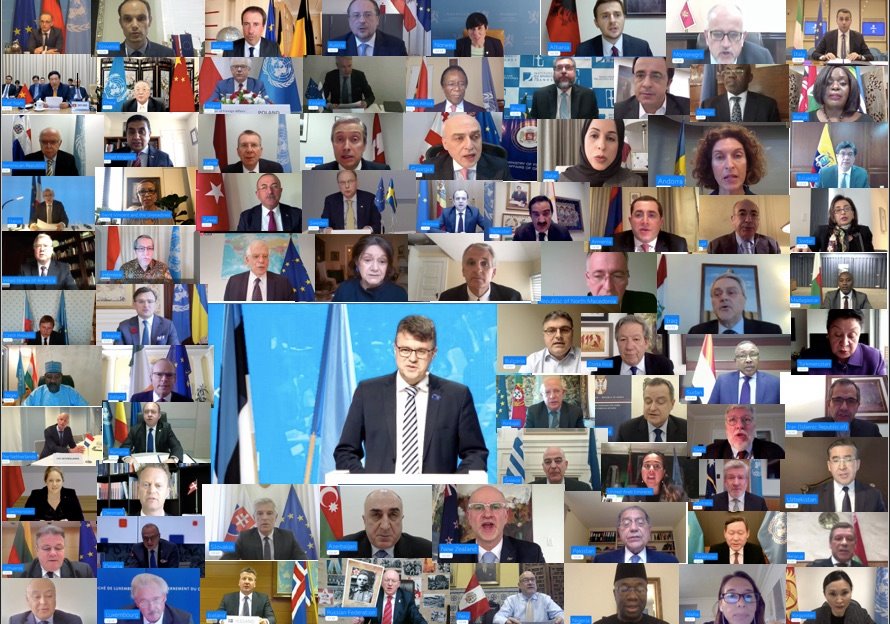May 2020 was a historical month for Estonia – for the first time, the country held the presidency of the United Nations Security Council; Estonia’s presidency happened during the COVID-19 crisis, a turbulent time in the whole world, and brought many lessons and achievements – Estonian World looks back at them.
Estonia is an elected non-permanent member of the UN Security Council in 2020 and 2021. Every month, one of the 15 members of the UN Security Council holds the presidency and Estonia held it for the first time in May. On 1 June, Estonia passed the baton to France.
The challenges and opportunities
Liis Lipre-Järma, the head of the UN and Human Rights Division at the Estonian foreign ministry, had the assignment to support the team of Estonian diplomats in New York, and together with her Tallinn-based colleagues giving them guidelines and directions from the capital. According to her, the acceptance of Estonia to the UN Security Council was a maturity exam for the country.
“It was a huge opportunity to learn a lot, especially for our diplomats, to help relieve the global situation and alleviate human suffering. Although a lot of the work of the Security Council is routine, the country who holds the presidency of the Security Council can decide and influence the choice of briefers who share their experience and bring deeper knowledge. They can bring up topics that should be discussed,” she told Estonian World.
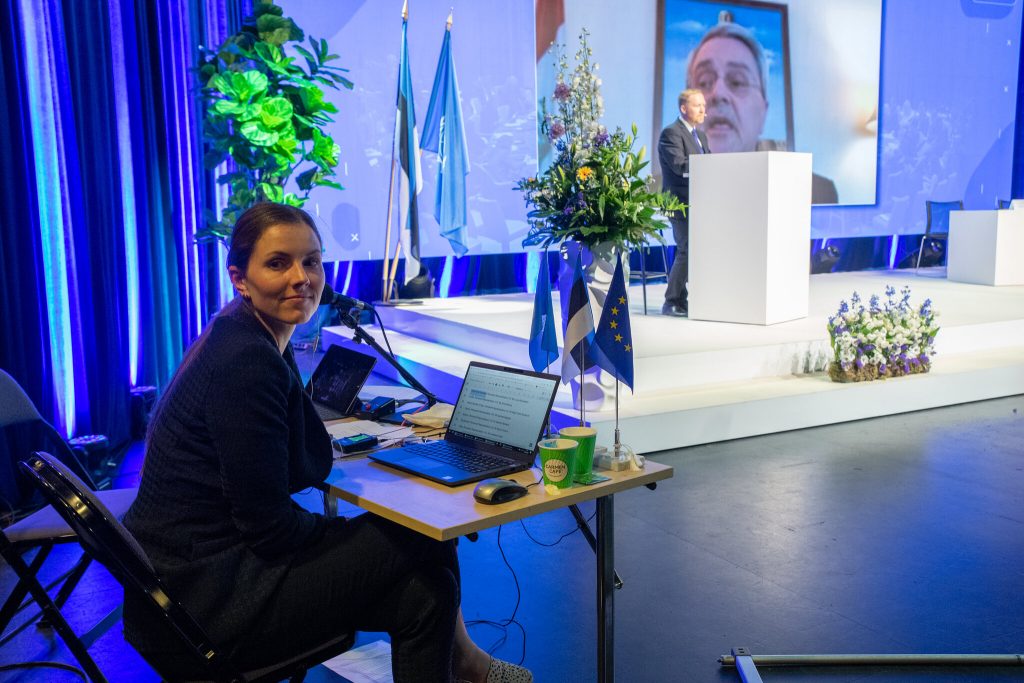
No game is played alone – Estonia had the opportunity to deepen the knowledge about multilateral co-operation and how to represent the country’s interests. “The UN Security Council means representing very many different positions and the work of our diplomats, especially the team in New York, has been of the highest quality,” Lipre-Järma said. “The greatest challenges have been the consultations between all the different countries who have different agendas. The ways to achieve common decisions and resolutions are usually long and complicated. The UN Security Council means finding common ground and achieving resolutions, which is always a great challenge for all diplomats. This experience has made us much, much stronger as a country.”
Digital solutions from a digital country
The COVID-19 crisis that is crippling the world also influenced the work of Security Council, and Estonia rose to the occasion as a digital country. For the first time in history, on 24 March 2020, the United Nations Security Council held a meeting via video conference.
“Estonia’s role has been to make sure the work of the Security Council is continued during the crisis, which we have achieved. Furthermore, we also achieved that all the sittings were broadcasted in the United Nations TV, bringing transparency and openness to the communication,” Paul Teesalu, the undersecretary for political affairs at the Estonian foreign ministry, explained.
Teesalu added that the crisis had shown that many topics can be discussed and coordinated via phone calls, e-mail or video calls and that diplomats had relied on technical solutions and telecommunications more than ever before. “The real goal, of course, is to come out of this worldwide crisis and have regular meetings once again,” he said.
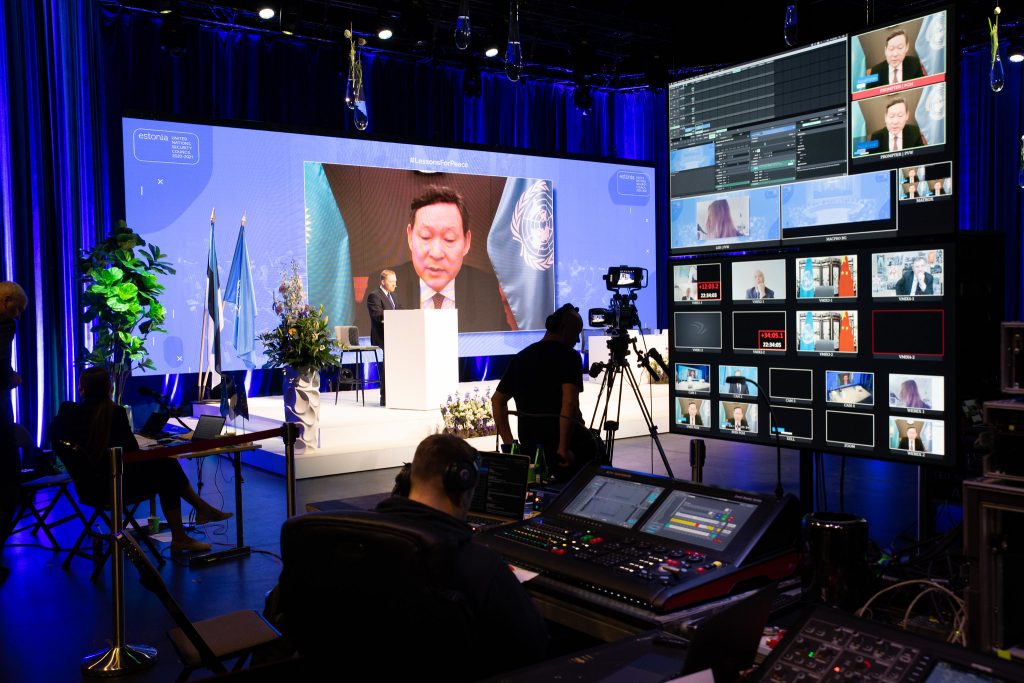
Sven Jürgenson, Estonia’s permanent representative to the UN, also underlined Estonia’s digital success. “My colleagues and I have received countless congratulatory messages. We left our digital footprint and took organising a high-level meeting at the UN to a completely new level,” he said.
Furthermore, the Estonian company, Global Virtual Solutions, which has developed the Hybridity platform and supported the technical side of organised events, has so far received more attention from all over the world, adding to the success story of innovative Estonian companies.
Estonia continues to stand for its values
During the presidency of the UN Security Council, Estonia continued to show its strong support towards Ukraine and Georgia. Even before the presidency, the first informal meeting the country organised as a non-permanent Security Council member, was on the topic of human rights in Crimea – part of Ukraine annexed by Russia in 2014. On 5 March, Estonia raised the question of cyberattacks against Georgia, during a closed session – the first time cyberattacks were officially discussed as a separate matter in the Security Council.
Other values Estonia emphasised during its presidency were related to the ongoing coronavirus crisis as it posed a threat to the global security environment. Estonia supported the UN Secretary-General’s call for a global ceasefire, continuing peacekeeping missions and ensuring full access to humanitarian aid in crisis areas. Estonia also led some of the discussions on the pandemic at the Security Council and on the country’s initiative, the first council meeting on the issue was held on 9 April. Furthermore, Estonia was one of the leading countries to make sure that members of the Security Council were informed about important developments related to the novel coronavirus.
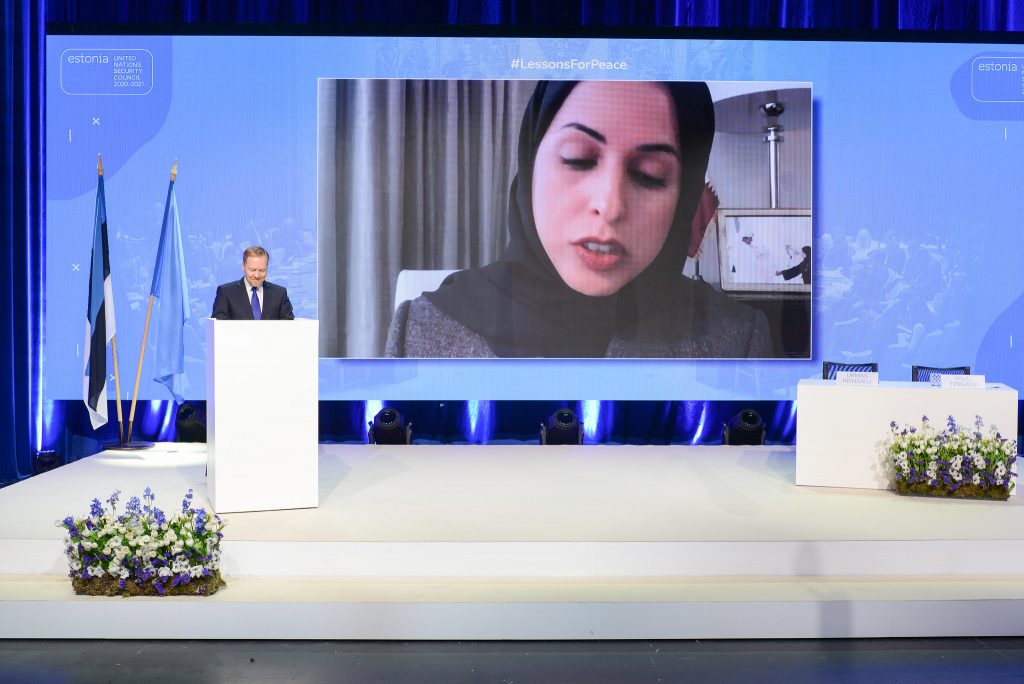
Another value was ensuring the transparency and working methods during the crisis. To increase efficiency and transparency, Estonia held an open debate on the working methods of the council on 15 May.
For Estonia, the most important principle is the prohibition of the use and threat of force. International law, human rights violations and accountability were another important focus during the presidency, and in this context, the situation in Syria and the three tracks of the Security Council agenda (political, humanitarian, and chemical weapons) remain a priority for the country. “The situation in Syria hurts and it has been under constant surveillance and the world media has brought attention to the atrocities happening there. Unfortunately, there is a great divide in opinions regarding Syria and the public pressure, which makes reaching agreements difficult,” Liis Lipre-Järma observed.
The events that made a difference
All in all, the presidency of UN Security Council is still a routine affair where the country holding the presidency has the opportunity to make the most impact by adding their own sittings and meetings, usually informal ones, to the schedule.
During Estonia´s presidency, altogether five resolutions were passed and four of them related to extending the mandate of peacekeeping or political missions in the Darfur region of Sudan, as well as in Somalia and Iraq. The fifth extension was the sanctions imposed on South Sudan. Even more importantly, Estonia organised many signature events that received a lot of attention, the most important ones being Europe Day on 8 May, and the special event on cybersecurity on 22 May.
On 8 May, Europe Day took place in the format of a high-level open debate. “This meeting was the largest international event to mark the 75th anniversary of the Second World War in Europe,” Urmas Reinsalu, Estonia’s foreign minister, said. “It thwarted, in front of the world, Russia’s attempts to use 9 May to manipulate history. The acknowledgment that the Second World War began with the secret protocol of the Molotov-Ribbentrop Pact and that the end of hostilities unfortunately did not bring freedom to many European peoples rang clearly. We also reminded the international community of Russia’s ongoing aggression against its neighbours in today’s Europe.”
According to Reinsalu, the event achieved its objectives. “Under Estonia’s leadership, the UN member states gave a clear signal of the importance of international exchange at a high level; we defended historical truth from manipulation and reminded the world of the ongoing security crisis in Europe,” he highlighted.
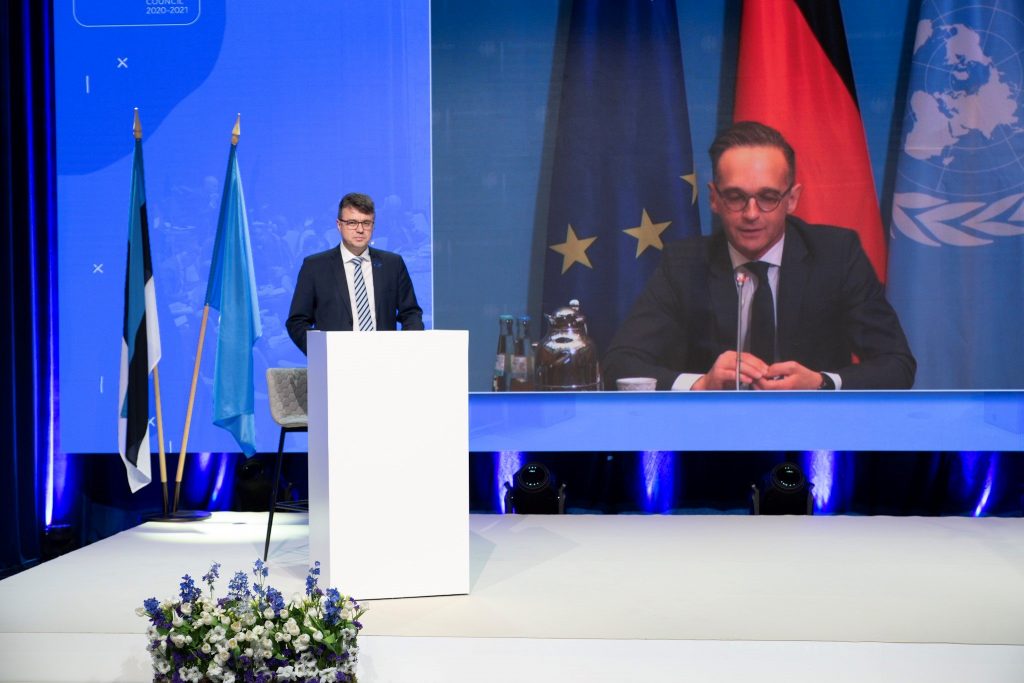
The interest in the event was high already before it happened, and as a result, 45 ministers and a total of 80 countries participated. “To say that the feedback we received was positive and excited would even be an understatement,” Sven Jürgenson noted with a smile. “It also seems that most countries unanimously agree that Estonia should be in charge of video conferences from now on – the quality as well as the content was claimed to be excellent”. He added that the video format was beneficial for the event, creating a high-class discussion where everyone could participate without having to leave their country.
On 27 May, high-level discussion on the protection of civilians was held. Opening remarks were made by the UN Secretary-General, António Guterres; the president of the International Committee of the Red Cross, Peter Maurer; and the Nobel Peace Prize winner, Ellen Johnson Sirleaf. The discussion was chaired by Sven Jürgenson and a speech on behalf of the Republic of Estonia was delivered by the Estonian president, Kersti Kaljulaid.
The main purpose of the meeting was to discuss the Secretary-General’s annual report about the protection of civilians in armed conflict. Based on the priorities of the Estonia’s Security Council membership, the focus was on the implementation of international law, including international humanitarian law and respect for human rights in conflict, as well as new aspects of civilian protection (including COVID-19 effects, new technologies, conflict urbanisation, climate change).
During her speech, Kaljulaid emphasised that “Estonia has put the principles of international law, including international humanitarian law and international human rights law, at the centre of our work here, in the Security Council”, while stating her concern that the current pandemic cannot be used as a pretext or excuse to obstruct access of humanitarian aid in crisis areas. The president went on to explain how “at the same time, we have seen cyber-attacks targeting critical infrastructure, including healthcare”. “Therefore, existing international law needs to apply also in cyber space. And cyber security must be part of both conflict prevention and resolutions. Estonia promised to bring cyber security to the Security Council and I believe we have delivered.”
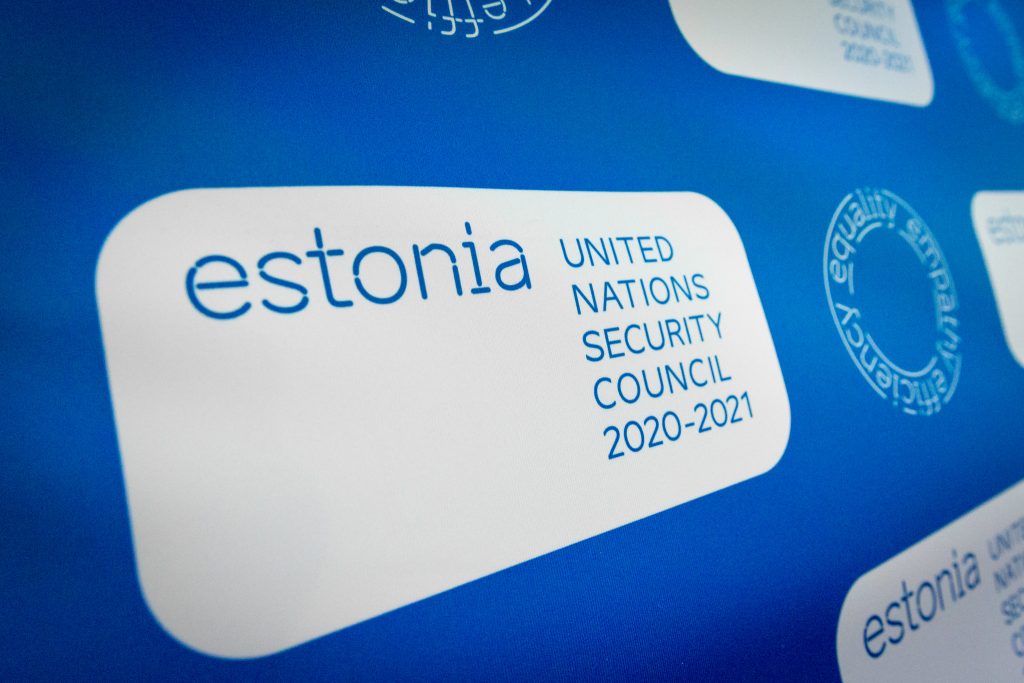
On 28 May, UN Security Council organised a public session on the UN-EU cooperation, held annually. It was the first time that the council was briefed by the EU’s high representative of foreign affairs, Josep Borell Fontelles. Estonia was represented by its foreign minister. The annual sessions discuss cooperation between the UN and the EU, present European Union’s foreign and security policy, and address ongoing crises in which both the EU and the UN are involved.
“The popularity of the organised events, especially Europe Day and the cybersecurity event, surpassed our expectation and the teamwork has been fantastic. After all the hard work and preparation, it has left our diplomats feeling festive and proud,” Paul Teesalu noted.
The issues of cybersecurity
If there is a topic Estonia is most passionate about, it is cybersecurity. A special event on cybersecurity was held on 22 May. The meeting took place on Hybridity – a platform for virtual events, developed in Estonia.
The event aimed to emphasise the validity of international laws in cyberspace and the rules of conduct applicable to all UN member states and in total, about 60 countries and organisations participated. “This crisis has shown how important the reliability of digital infrastructure is and how we must work together for a stable and secure cyberspace,” Urmas Reinsalu said at the opening of the meeting.
The Estonian prime minister, Jüri Ratas, pointed out that the global COVID-19 crisis had put additional pressure on digital services, and that is why now was the right time to talk about cyber stability. The same was confirmed by many countries in their speeches. Reinsalu also announced that Estonia planned to hold an international meeting soon to address the possibilities of digitisation in response to the COVID-19 crisis.
According to Heli Tiirmaa-Klaar, Estonian foreign ministry’s ambassador at large for cybersecurity, one of the main goals of the event was to loudly consolidate previous UN agreements on cyber stability. “With this meeting, Estonia showed that we are a driving force in discussing new threats in the UN Security Council. Internationally, it is a significant fact that the conviction of Estonia and many other countries that cyberspace is not different from other areas where international law is applied remained strong,” she noted.
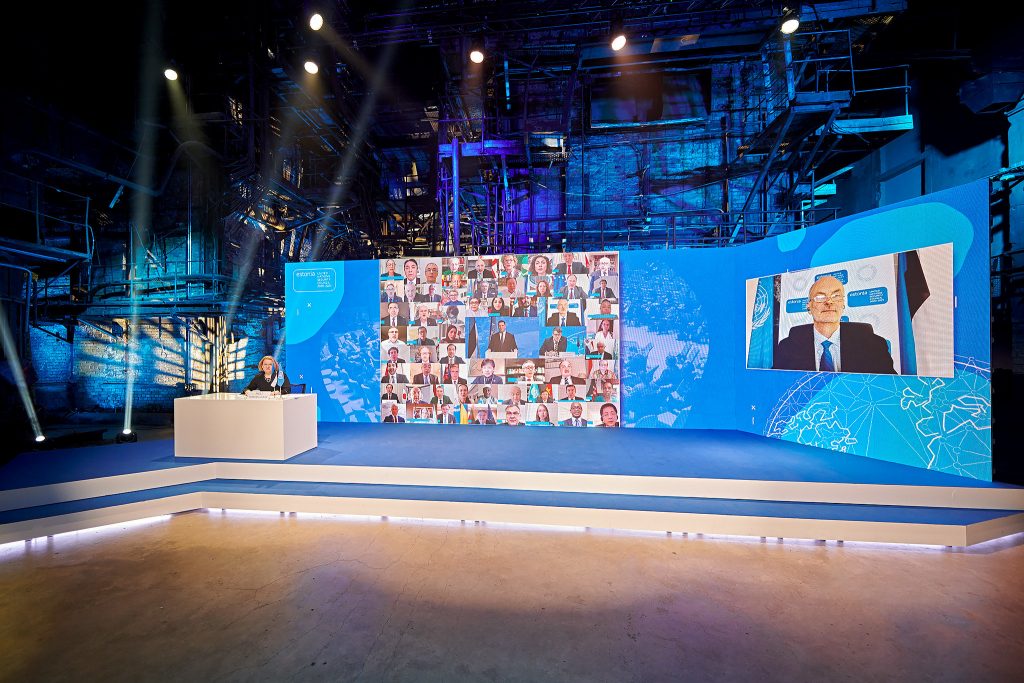
Dr James Lewis, a top expert at the Center for Strategic and International Studies in Washington, who briefed the Security Council members and other UN member states at the meeting, called the event “a remarkable contribution to bringing the issue to the Security Council’s attention”.
The “European spring” continues
Estonia´s presidency of the Security Council is followed by France and then Germany, and the occasion has already earned the name “European Spring” in diplomatic circles. According to Liis Lipre-Järma, Estonia always relies on the support of the other members of the European Union who share its values, goals and visions of the future.
The only disappointment of the presidency, as expressed by Sven Jürgenson, is that the worldwide ceasefire during the coronavirus crisis, proposed by the UN Secretary-General, António Guterres, already in March, has unfortunately still not been achieved, despite many discussion and sittings.
Urmas Reinsalu also agrees that this might be the only bitter pill during the whole experience that Estonia could unfortunately not see come to action. “A ceasefire is necessary to ensure the safety of humanitarian workers and Estonia and Germany were giving the best efforts to come out of this situation, but unfortunately it has been a geopolitical struggle so far. This unfortunately means the UN Security Council could not reach a resolution despite months of discussions,” he said. “This topic will continue to be on the table every day and will continue to be relevant.”
“The tight co-operation could especially be seen through the common statements where the EU countries had an opportunity to demonstrate the role of the EU on an international arena. The topics that are discussed in Brussels are also discussed in New York,” Liis Lipre-Järma noted, emphasising that the discussions between countries on the topic of overcoming COVID-19 crisis and opening borders are ongoing in the world and will continue on all levels.
Estonia will take over the presidency again in the summer of 2021.

